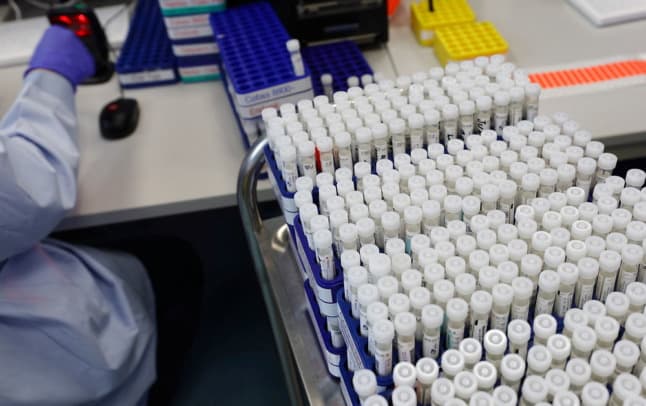Covid-19: Number of Danish ICU patients falls as infection numbers go up

After Denmark this week lifted Covid-19 restrictions, the number of new infections hit a new record while the number of patients in intensive care continues to fall.
Daily data from national infectious disease agency State Serum Institute (SSI) showed that 55,001 new cases have been detected during the last day, the highest 24-hour figure so far during the pandemic.
204,652 tests were administered, giving a positivity rate of just under 27 percent.
The numbers from Wednesday come after almost all Covid-19 restrictions were lifted on Tuesday, with the government citing the milder Omicron variant, high vaccination rates and the falling number of intensive care patients as a bases for easing curbs.
READ ALSO: Denmark returns to ‘life as we knew it’ as Covid-19 restrictions end despite Omicron
The number of patients with Covid-19 in Danish hospitals rose to 1,092, which is also a new high.
But a large proportion of that figure is patients who are in hospital for reasons other than Covid-19, but who have tested positive for the virus currently.
256 of the patients are admitted to psychiatric departments, while the Danish Health Authority said in a weekly report on Tuesday that it estimates around 250-300 of the patients are admitted due to respiratory infections caused by Covid-19.
The total number of ICU patients with Covid-19 has now fallen to 26, significantly fewer than at the beginning of 2022. 16 of them are receiving ventilator treatment.
“This shows that the strain (on hospitals) and serious illness are more or less in balance,” Svend Ellermann-Eriksen, senior medical consultant at Aarhus University Hospital’s microbiology department, told news wire Ritzau.
The patients with Covid-19 nevertheless do require extra resources, he noted.
“There is some extra protective equipment. We already use face masks when we are close to patients but here we must also have a visor and apron on. Protective equipment must be put on and off and that takes time,” he said.
“This puts a clear strain on hospitals which is not insignificant. But we can be happy on the other hand, because it’s not causing patients to get badly ill,” he said.
Comments
See Also
Daily data from national infectious disease agency State Serum Institute (SSI) showed that 55,001 new cases have been detected during the last day, the highest 24-hour figure so far during the pandemic.
204,652 tests were administered, giving a positivity rate of just under 27 percent.
The numbers from Wednesday come after almost all Covid-19 restrictions were lifted on Tuesday, with the government citing the milder Omicron variant, high vaccination rates and the falling number of intensive care patients as a bases for easing curbs.
READ ALSO: Denmark returns to ‘life as we knew it’ as Covid-19 restrictions end despite Omicron
The number of patients with Covid-19 in Danish hospitals rose to 1,092, which is also a new high.
But a large proportion of that figure is patients who are in hospital for reasons other than Covid-19, but who have tested positive for the virus currently.
256 of the patients are admitted to psychiatric departments, while the Danish Health Authority said in a weekly report on Tuesday that it estimates around 250-300 of the patients are admitted due to respiratory infections caused by Covid-19.
The total number of ICU patients with Covid-19 has now fallen to 26, significantly fewer than at the beginning of 2022. 16 of them are receiving ventilator treatment.
“This shows that the strain (on hospitals) and serious illness are more or less in balance,” Svend Ellermann-Eriksen, senior medical consultant at Aarhus University Hospital’s microbiology department, told news wire Ritzau.
The patients with Covid-19 nevertheless do require extra resources, he noted.
“There is some extra protective equipment. We already use face masks when we are close to patients but here we must also have a visor and apron on. Protective equipment must be put on and off and that takes time,” he said.
“This puts a clear strain on hospitals which is not insignificant. But we can be happy on the other hand, because it’s not causing patients to get badly ill,” he said.
Join the conversation in our comments section below. Share your own views and experience and if you have a question or suggestion for our journalists then email us at [email protected].
Please keep comments civil, constructive and on topic – and make sure to read our terms of use before getting involved.
Please log in here to leave a comment.